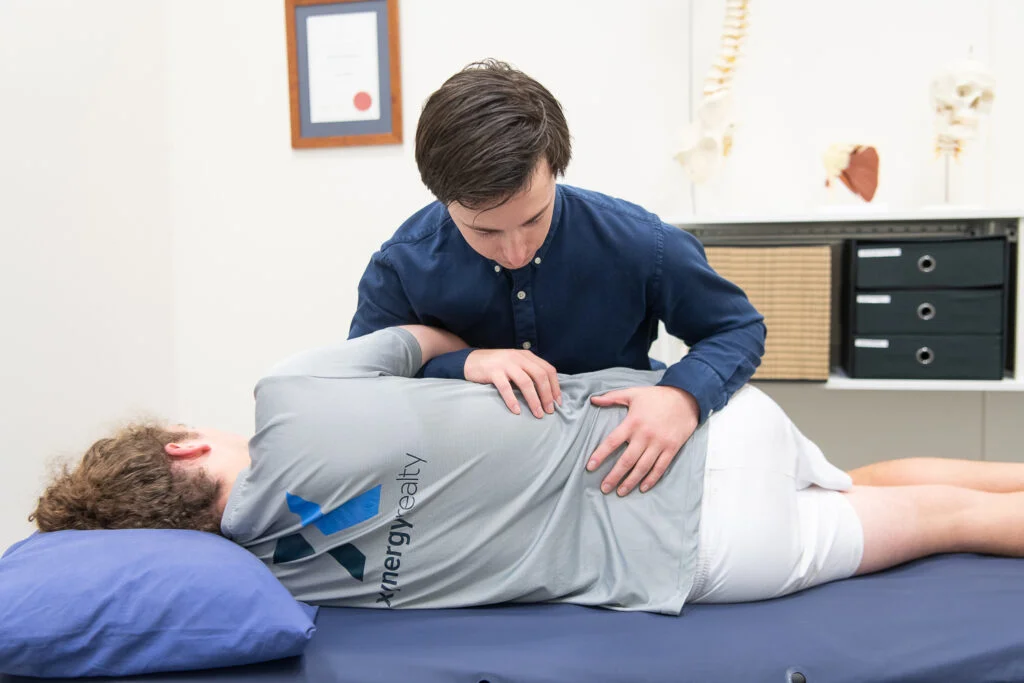
Low back pain affects 8 out of 10 people in their lifetime. For many it is a persistent problem, limiting the ability to get about to enjoy life and do what you need to do for work, sport and recreation. In many cases failed poorly targeted treatments are just as much a problem.

Low Back Pain occurs anywhere from the lower rib cage to the buttock area and is not a diagnosis it is just a description! When back pain is examined, several factors need to be considered.
This will come down to each person’s type of back pain. It can be grouped into two broad categories. Ones that can be changed, such as strength, posture, habitual movements and movement sense. The other category are those things that are fixed, like your genetics, and to a good extent, your structure. Let’s look at the factors that you can change.
No one's posture is good or better, posture is not fixed. In fact, good posture involves a healthy change of posture. Mix it up and move!
Scientists now know that stress and poor sleep habits can affect your back’s ability to recover from your day or from an injury.
How you move is your fingerprint. Everyone has one of these. Some of us move in ways that ramp up the workload to the back and cause pain, and it is not necessarily doing hard work! Pain is a handbrake to muscles working properly to support, move and protect your back.
This means more about your levels of activity as well as habits that don’t help such as smoking, lack of exercise or just not being very mobile.
What do you believe about your diagnosis and how you think it should be treated? In fact, there is so much incorrect information circulating about back pain and how to manage it that it can become a bigger barrier to recovery in itself. Examples of what people tell us are that something is out of place, bedrest is good, school bags are bad, and that the amount of pain or a scan is a barometer of back health. All completely wrong! Healthy information about your treatment and recovery is important.
At some point, almost all of us will experience some back pain. For most of us, surgery is not going to be needed. Back pain can be linked to what he inherited from our parents, past or recent injuries, changes with age that are natural, and the kind of work and sports we do.
The real question is what can you do to reduce the risk of low back pain and how to best manage, control it and reduce the risk of re-injury.
This is the word that describes symptoms of buttock and leg pain. It may relate to back pain. The nerve undergoes some sort of inflammation with immunological reaction, either with or without compression and along with immunological processes seems to be the important cause of sciatica pain.
NO, in short. Many radiology findings are part of life, variations of normal. Excessive attention on these can be a waste of time and bad for your health if the focus is on findings that are not important, nor will they solve any problems. If you have them already, you are welcome to bring them to your first appointment.
If we feel you need a scan or x-ray we can refer out specifically for the views and kinds of images we need to see for your issue.
We are a clinic of experienced practitioners working together for you. We use the best scientific research to inform the decisions we take for your care. We do this with honesty and empathy.
Usually, back pain is benign and most people recover. We screen for things that could be problematic or just potentially nasty. If we have doubts about your back pain we will work with your Doctor.
Getting imaging can cause you to focus on changes that are just normal as a part of life’s journey. If you need imaging we will let you know, we will also work out what kind of imaging you need. We have more to read here.
Absolutely not. You have to fracture your pelvis for it to be out of alignment. We can diagnose and treat pelvic girdle pain.
No, we are not born symmetrical and we don’t grow symmetrically. We are always variations of ‘normal’. We are only concerned if the difference is larger than 2cm and you will need a special x-ray from a medical doctor to determine this.
Our life, our day, our work and our play is a showcase of different postures.There is no one good or bad posture.
Genetics play a part, but so many other things do as well that you can change.
Exercising is a treatment for back pain and many other problems. Get our guidance but don’t let your fitness slip.
This is a good question. Simply assuming things are fine when the pain goes, does not mean the cause is gone. This is why we encourage people to see their rehab through to completion when pain is gone and the measures we took of them have also improved. Moving forwards to reduce recurrence we also recommend people adopt healthy lifestyle choices, such as exercise, a positive workplace environment, and postural awareness once they cease treatment with us.
Each part of the spine is an integrated unit of joints, disc, muscle, ligaments. It will be a combination of both and will vary between each of us. What really is important for us to know is what drives your back to behave like this….then we can tackle it successfully be it muscular or otherwise.